Globalisation's Complex Relationship with State Sovereignty Analysis
VerifiedAdded on 2023/03/31
|6
|1369
|325
Essay
AI Summary
This essay examines the intricate relationship between globalisation and state sovereignty, focusing on how economic growth and power dynamics are affected. It defines both globalisation and sovereignty, highlighting the debate among political scholars regarding the impact of globalisation on state sovereignty. The essay explores the traditional concept of sovereignty and how globalisation has transformed it, opening paths for the transfer of goods, services, information, and people. It discusses arguments from hyper-globalists and critics, presenting different viewpoints on whether globalisation undermines or enhances state sovereignty. The essay further analyzes the role of international institutions, the evolution of political ideologies, and the increasing interconnectedness facilitated by technology. It also explores the social and political implications of globalisation, including human rights and labor rights. The conclusion suggests that globalisation, when utilized properly, can empower states and enhance their presence in the global economy.
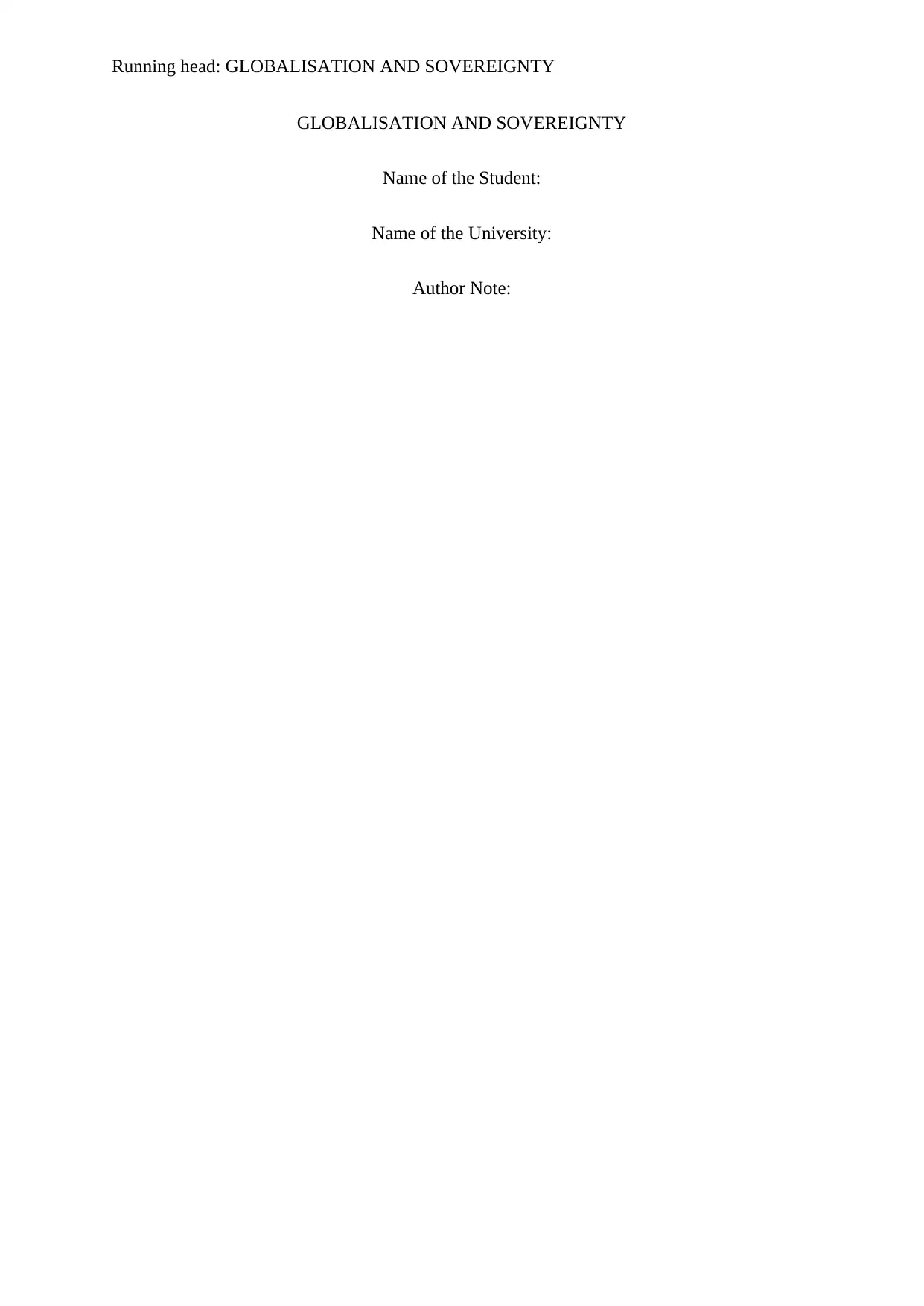
Running head: GLOBALISATION AND SOVEREIGNTY
GLOBALISATION AND SOVEREIGNTY
Name of the Student:
Name of the University:
Author Note:
GLOBALISATION AND SOVEREIGNTY
Name of the Student:
Name of the University:
Author Note:
Paraphrase This Document
Need a fresh take? Get an instant paraphrase of this document with our AI Paraphraser
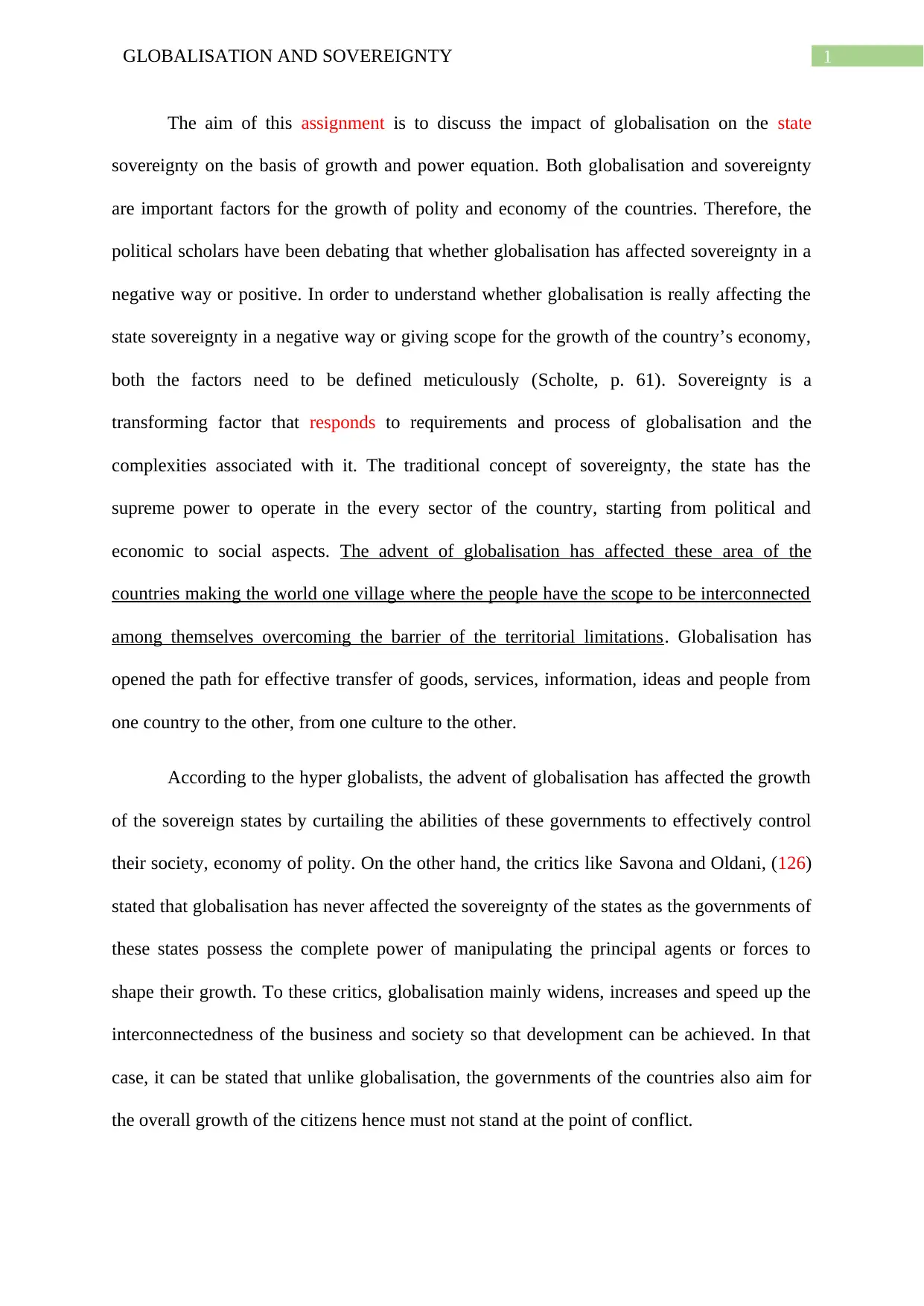
1GLOBALISATION AND SOVEREIGNTY
The aim of this assignment is to discuss the impact of globalisation on the state
sovereignty on the basis of growth and power equation. Both globalisation and sovereignty
are important factors for the growth of polity and economy of the countries. Therefore, the
political scholars have been debating that whether globalisation has affected sovereignty in a
negative way or positive. In order to understand whether globalisation is really affecting the
state sovereignty in a negative way or giving scope for the growth of the country’s economy,
both the factors need to be defined meticulously (Scholte, p. 61). Sovereignty is a
transforming factor that responds to requirements and process of globalisation and the
complexities associated with it. The traditional concept of sovereignty, the state has the
supreme power to operate in the every sector of the country, starting from political and
economic to social aspects. The advent of globalisation has affected these area of the
countries making the world one village where the people have the scope to be interconnected
among themselves overcoming the barrier of the territorial limitations. Globalisation has
opened the path for effective transfer of goods, services, information, ideas and people from
one country to the other, from one culture to the other.
According to the hyper globalists, the advent of globalisation has affected the growth
of the sovereign states by curtailing the abilities of these governments to effectively control
their society, economy of polity. On the other hand, the critics like Savona and Oldani, (126)
stated that globalisation has never affected the sovereignty of the states as the governments of
these states possess the complete power of manipulating the principal agents or forces to
shape their growth. To these critics, globalisation mainly widens, increases and speed up the
interconnectedness of the business and society so that development can be achieved. In that
case, it can be stated that unlike globalisation, the governments of the countries also aim for
the overall growth of the citizens hence must not stand at the point of conflict.
The aim of this assignment is to discuss the impact of globalisation on the state
sovereignty on the basis of growth and power equation. Both globalisation and sovereignty
are important factors for the growth of polity and economy of the countries. Therefore, the
political scholars have been debating that whether globalisation has affected sovereignty in a
negative way or positive. In order to understand whether globalisation is really affecting the
state sovereignty in a negative way or giving scope for the growth of the country’s economy,
both the factors need to be defined meticulously (Scholte, p. 61). Sovereignty is a
transforming factor that responds to requirements and process of globalisation and the
complexities associated with it. The traditional concept of sovereignty, the state has the
supreme power to operate in the every sector of the country, starting from political and
economic to social aspects. The advent of globalisation has affected these area of the
countries making the world one village where the people have the scope to be interconnected
among themselves overcoming the barrier of the territorial limitations. Globalisation has
opened the path for effective transfer of goods, services, information, ideas and people from
one country to the other, from one culture to the other.
According to the hyper globalists, the advent of globalisation has affected the growth
of the sovereign states by curtailing the abilities of these governments to effectively control
their society, economy of polity. On the other hand, the critics like Savona and Oldani, (126)
stated that globalisation has never affected the sovereignty of the states as the governments of
these states possess the complete power of manipulating the principal agents or forces to
shape their growth. To these critics, globalisation mainly widens, increases and speed up the
interconnectedness of the business and society so that development can be achieved. In that
case, it can be stated that unlike globalisation, the governments of the countries also aim for
the overall growth of the citizens hence must not stand at the point of conflict.
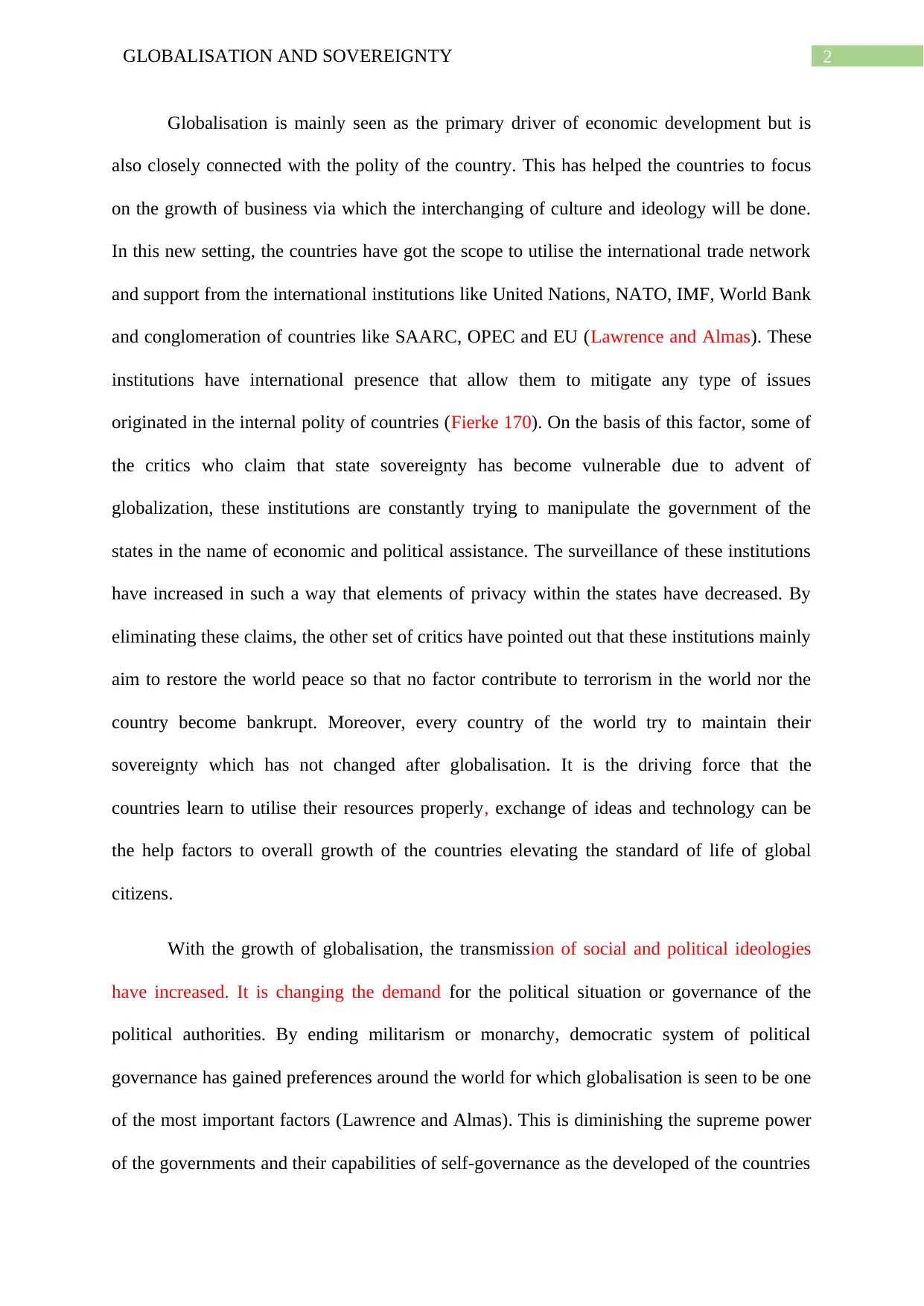
2GLOBALISATION AND SOVEREIGNTY
Globalisation is mainly seen as the primary driver of economic development but is
also closely connected with the polity of the country. This has helped the countries to focus
on the growth of business via which the interchanging of culture and ideology will be done.
In this new setting, the countries have got the scope to utilise the international trade network
and support from the international institutions like United Nations, NATO, IMF, World Bank
and conglomeration of countries like SAARC, OPEC and EU (Lawrence and Almas). These
institutions have international presence that allow them to mitigate any type of issues
originated in the internal polity of countries (Fierke 170). On the basis of this factor, some of
the critics who claim that state sovereignty has become vulnerable due to advent of
globalization, these institutions are constantly trying to manipulate the government of the
states in the name of economic and political assistance. The surveillance of these institutions
have increased in such a way that elements of privacy within the states have decreased. By
eliminating these claims, the other set of critics have pointed out that these institutions mainly
aim to restore the world peace so that no factor contribute to terrorism in the world nor the
country become bankrupt. Moreover, every country of the world try to maintain their
sovereignty which has not changed after globalisation. It is the driving force that the
countries learn to utilise their resources properly, exchange of ideas and technology can be
the help factors to overall growth of the countries elevating the standard of life of global
citizens.
With the growth of globalisation, the transmission of social and political ideologies
have increased. It is changing the demand for the political situation or governance of the
political authorities. By ending militarism or monarchy, democratic system of political
governance has gained preferences around the world for which globalisation is seen to be one
of the most important factors (Lawrence and Almas). This is diminishing the supreme power
of the governments and their capabilities of self-governance as the developed of the countries
Globalisation is mainly seen as the primary driver of economic development but is
also closely connected with the polity of the country. This has helped the countries to focus
on the growth of business via which the interchanging of culture and ideology will be done.
In this new setting, the countries have got the scope to utilise the international trade network
and support from the international institutions like United Nations, NATO, IMF, World Bank
and conglomeration of countries like SAARC, OPEC and EU (Lawrence and Almas). These
institutions have international presence that allow them to mitigate any type of issues
originated in the internal polity of countries (Fierke 170). On the basis of this factor, some of
the critics who claim that state sovereignty has become vulnerable due to advent of
globalization, these institutions are constantly trying to manipulate the government of the
states in the name of economic and political assistance. The surveillance of these institutions
have increased in such a way that elements of privacy within the states have decreased. By
eliminating these claims, the other set of critics have pointed out that these institutions mainly
aim to restore the world peace so that no factor contribute to terrorism in the world nor the
country become bankrupt. Moreover, every country of the world try to maintain their
sovereignty which has not changed after globalisation. It is the driving force that the
countries learn to utilise their resources properly, exchange of ideas and technology can be
the help factors to overall growth of the countries elevating the standard of life of global
citizens.
With the growth of globalisation, the transmission of social and political ideologies
have increased. It is changing the demand for the political situation or governance of the
political authorities. By ending militarism or monarchy, democratic system of political
governance has gained preferences around the world for which globalisation is seen to be one
of the most important factors (Lawrence and Almas). This is diminishing the supreme power
of the governments and their capabilities of self-governance as the developed of the countries
⊘ This is a preview!⊘
Do you want full access?
Subscribe today to unlock all pages.

Trusted by 1+ million students worldwide
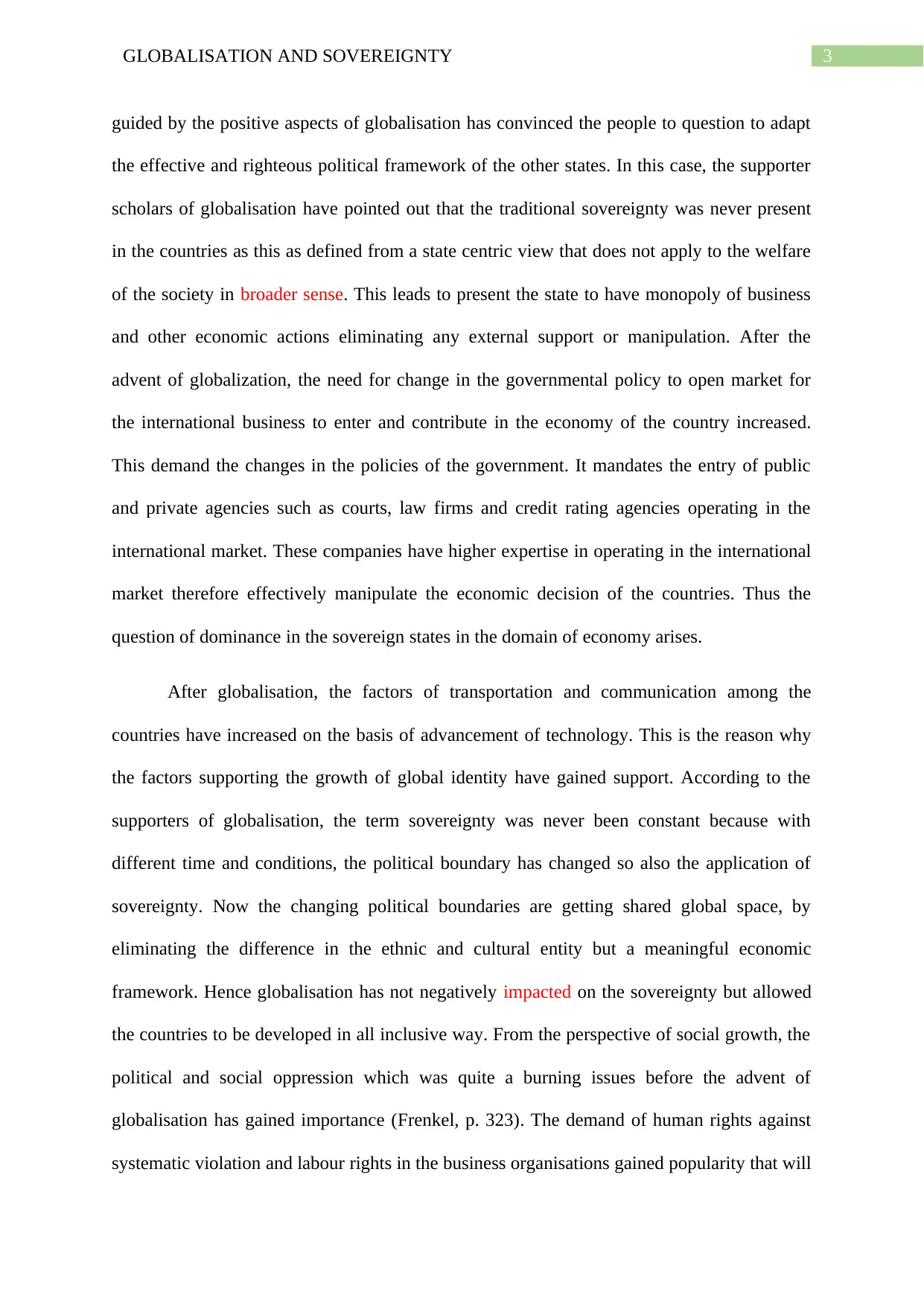
3GLOBALISATION AND SOVEREIGNTY
guided by the positive aspects of globalisation has convinced the people to question to adapt
the effective and righteous political framework of the other states. In this case, the supporter
scholars of globalisation have pointed out that the traditional sovereignty was never present
in the countries as this as defined from a state centric view that does not apply to the welfare
of the society in broader sense. This leads to present the state to have monopoly of business
and other economic actions eliminating any external support or manipulation. After the
advent of globalization, the need for change in the governmental policy to open market for
the international business to enter and contribute in the economy of the country increased.
This demand the changes in the policies of the government. It mandates the entry of public
and private agencies such as courts, law firms and credit rating agencies operating in the
international market. These companies have higher expertise in operating in the international
market therefore effectively manipulate the economic decision of the countries. Thus the
question of dominance in the sovereign states in the domain of economy arises.
After globalisation, the factors of transportation and communication among the
countries have increased on the basis of advancement of technology. This is the reason why
the factors supporting the growth of global identity have gained support. According to the
supporters of globalisation, the term sovereignty was never been constant because with
different time and conditions, the political boundary has changed so also the application of
sovereignty. Now the changing political boundaries are getting shared global space, by
eliminating the difference in the ethnic and cultural entity but a meaningful economic
framework. Hence globalisation has not negatively impacted on the sovereignty but allowed
the countries to be developed in all inclusive way. From the perspective of social growth, the
political and social oppression which was quite a burning issues before the advent of
globalisation has gained importance (Frenkel, p. 323). The demand of human rights against
systematic violation and labour rights in the business organisations gained popularity that will
guided by the positive aspects of globalisation has convinced the people to question to adapt
the effective and righteous political framework of the other states. In this case, the supporter
scholars of globalisation have pointed out that the traditional sovereignty was never present
in the countries as this as defined from a state centric view that does not apply to the welfare
of the society in broader sense. This leads to present the state to have monopoly of business
and other economic actions eliminating any external support or manipulation. After the
advent of globalization, the need for change in the governmental policy to open market for
the international business to enter and contribute in the economy of the country increased.
This demand the changes in the policies of the government. It mandates the entry of public
and private agencies such as courts, law firms and credit rating agencies operating in the
international market. These companies have higher expertise in operating in the international
market therefore effectively manipulate the economic decision of the countries. Thus the
question of dominance in the sovereign states in the domain of economy arises.
After globalisation, the factors of transportation and communication among the
countries have increased on the basis of advancement of technology. This is the reason why
the factors supporting the growth of global identity have gained support. According to the
supporters of globalisation, the term sovereignty was never been constant because with
different time and conditions, the political boundary has changed so also the application of
sovereignty. Now the changing political boundaries are getting shared global space, by
eliminating the difference in the ethnic and cultural entity but a meaningful economic
framework. Hence globalisation has not negatively impacted on the sovereignty but allowed
the countries to be developed in all inclusive way. From the perspective of social growth, the
political and social oppression which was quite a burning issues before the advent of
globalisation has gained importance (Frenkel, p. 323). The demand of human rights against
systematic violation and labour rights in the business organisations gained popularity that will
Paraphrase This Document
Need a fresh take? Get an instant paraphrase of this document with our AI Paraphraser
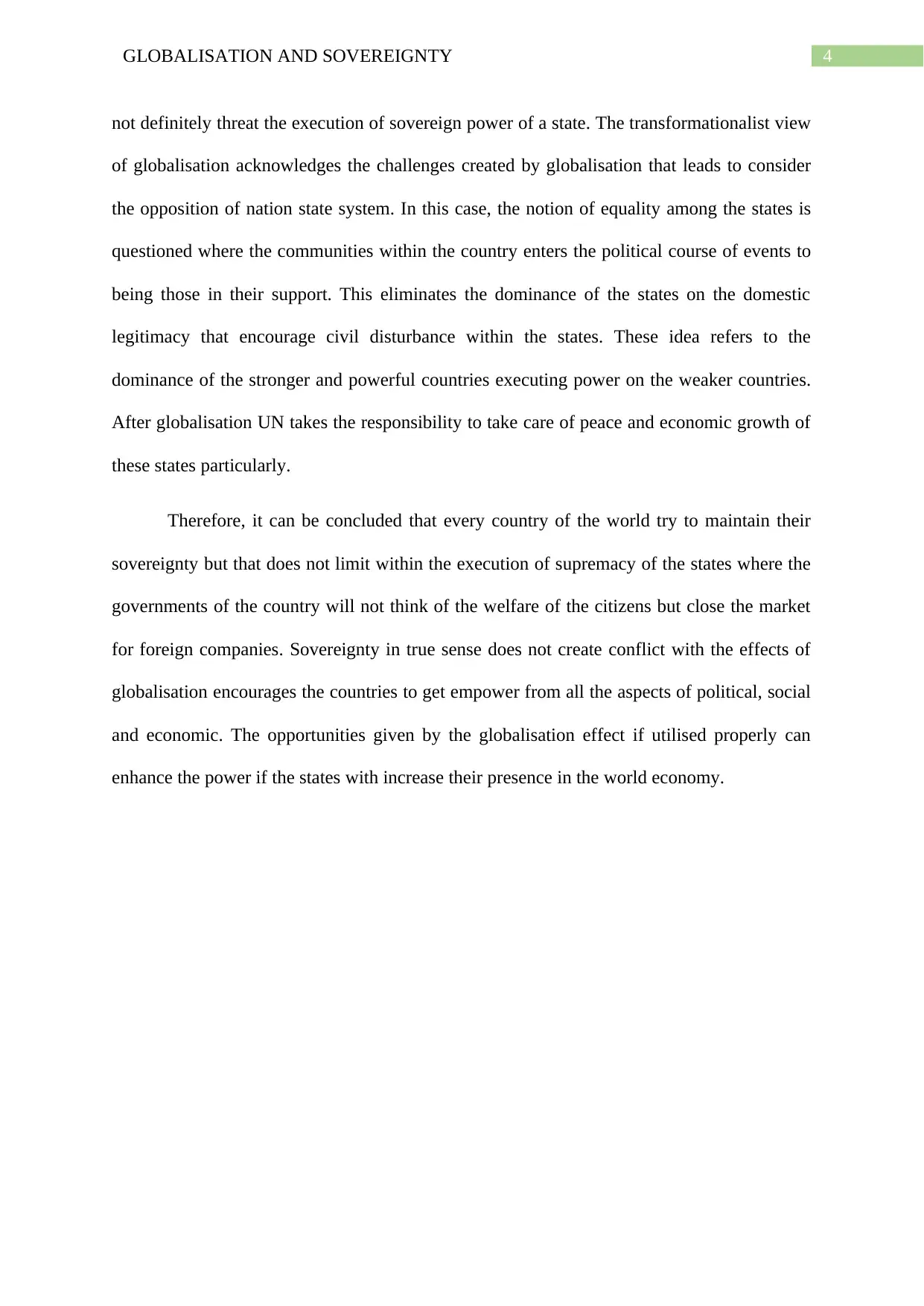
4GLOBALISATION AND SOVEREIGNTY
not definitely threat the execution of sovereign power of a state. The transformationalist view
of globalisation acknowledges the challenges created by globalisation that leads to consider
the opposition of nation state system. In this case, the notion of equality among the states is
questioned where the communities within the country enters the political course of events to
being those in their support. This eliminates the dominance of the states on the domestic
legitimacy that encourage civil disturbance within the states. These idea refers to the
dominance of the stronger and powerful countries executing power on the weaker countries.
After globalisation UN takes the responsibility to take care of peace and economic growth of
these states particularly.
Therefore, it can be concluded that every country of the world try to maintain their
sovereignty but that does not limit within the execution of supremacy of the states where the
governments of the country will not think of the welfare of the citizens but close the market
for foreign companies. Sovereignty in true sense does not create conflict with the effects of
globalisation encourages the countries to get empower from all the aspects of political, social
and economic. The opportunities given by the globalisation effect if utilised properly can
enhance the power if the states with increase their presence in the world economy.
not definitely threat the execution of sovereign power of a state. The transformationalist view
of globalisation acknowledges the challenges created by globalisation that leads to consider
the opposition of nation state system. In this case, the notion of equality among the states is
questioned where the communities within the country enters the political course of events to
being those in their support. This eliminates the dominance of the states on the domestic
legitimacy that encourage civil disturbance within the states. These idea refers to the
dominance of the stronger and powerful countries executing power on the weaker countries.
After globalisation UN takes the responsibility to take care of peace and economic growth of
these states particularly.
Therefore, it can be concluded that every country of the world try to maintain their
sovereignty but that does not limit within the execution of supremacy of the states where the
governments of the country will not think of the welfare of the citizens but close the market
for foreign companies. Sovereignty in true sense does not create conflict with the effects of
globalisation encourages the countries to get empower from all the aspects of political, social
and economic. The opportunities given by the globalisation effect if utilised properly can
enhance the power if the states with increase their presence in the world economy.
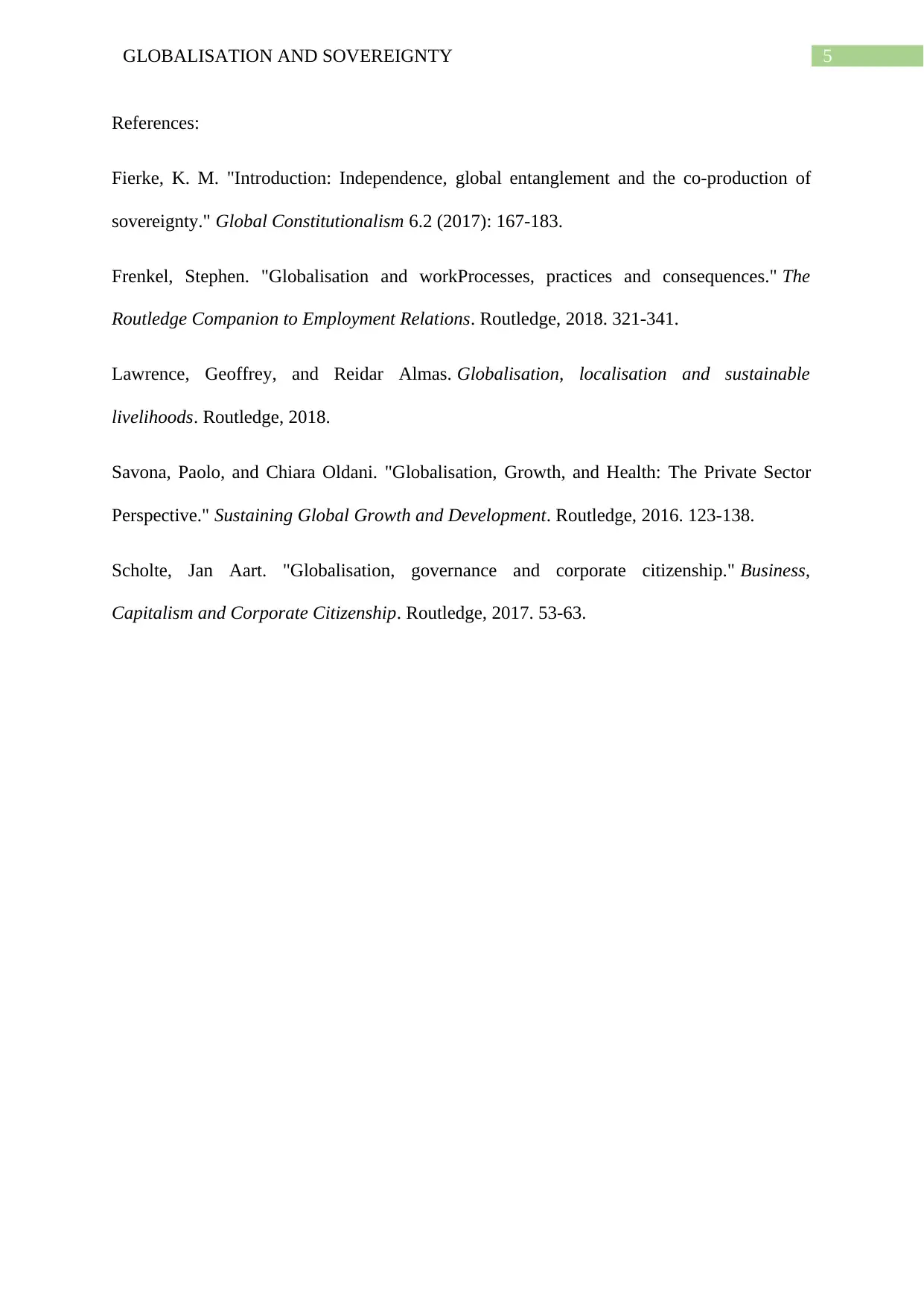
5GLOBALISATION AND SOVEREIGNTY
References:
Fierke, K. M. "Introduction: Independence, global entanglement and the co-production of
sovereignty." Global Constitutionalism 6.2 (2017): 167-183.
Frenkel, Stephen. "Globalisation and workProcesses, practices and consequences." The
Routledge Companion to Employment Relations. Routledge, 2018. 321-341.
Lawrence, Geoffrey, and Reidar Almas. Globalisation, localisation and sustainable
livelihoods. Routledge, 2018.
Savona, Paolo, and Chiara Oldani. "Globalisation, Growth, and Health: The Private Sector
Perspective." Sustaining Global Growth and Development. Routledge, 2016. 123-138.
Scholte, Jan Aart. "Globalisation, governance and corporate citizenship." Business,
Capitalism and Corporate Citizenship. Routledge, 2017. 53-63.
References:
Fierke, K. M. "Introduction: Independence, global entanglement and the co-production of
sovereignty." Global Constitutionalism 6.2 (2017): 167-183.
Frenkel, Stephen. "Globalisation and workProcesses, practices and consequences." The
Routledge Companion to Employment Relations. Routledge, 2018. 321-341.
Lawrence, Geoffrey, and Reidar Almas. Globalisation, localisation and sustainable
livelihoods. Routledge, 2018.
Savona, Paolo, and Chiara Oldani. "Globalisation, Growth, and Health: The Private Sector
Perspective." Sustaining Global Growth and Development. Routledge, 2016. 123-138.
Scholte, Jan Aart. "Globalisation, governance and corporate citizenship." Business,
Capitalism and Corporate Citizenship. Routledge, 2017. 53-63.
⊘ This is a preview!⊘
Do you want full access?
Subscribe today to unlock all pages.

Trusted by 1+ million students worldwide
1 out of 6
Related Documents
Your All-in-One AI-Powered Toolkit for Academic Success.
+13062052269
info@desklib.com
Available 24*7 on WhatsApp / Email
![[object Object]](/_next/static/media/star-bottom.7253800d.svg)
Unlock your academic potential
Copyright © 2020–2026 A2Z Services. All Rights Reserved. Developed and managed by ZUCOL.




